|
|
|
Sort Order |
|
|
|
Items / Page
|
|
|
|
|
|
|
| Srl | Item |
| 1 |
ID:
113632
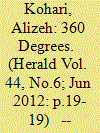

|
|
|
| 2 |
ID:
146671
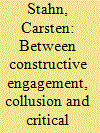

|
|
|
|
|
| Contents |
This article examines the approach and relationship of the ICRC to International Criminal Law. It argues that the International Committee of the Red Cross's (ICRC) position navigates between normative support, collusion and institutional restraint. The ICRC has shaped some of the foundations of contemporary criminal justice, through its early focus on the implementation of International Humanitarian Law (e.g., through implementation and prosecution of “grave breaches”) and its role as “gentle modernizer” of the law. But it has at the same time kept a critical distance towards International Criminal Law. Its approach is marked by three cardinal principles: structural independence, strategic engagement and systemic support. It is grounded in the distinct roles of the ICRC (guardianship, protection, advocacy and dissemination) and deeper structural challenges in the relationship between International Humanitarian Law and International Criminal Law. This contribution argues for a re-conceptualization of some of the existing approaches. It claims that it is unhelpful to theorize on the relationship between the ICRC and International Criminal Courts and Tribunals (ICCTs) on the basis of the premise that International Humanitarian Law provides a set of primary rules that are enforced through criminal institutions, or complemented by secondary rules under International Criminal Law (e.g., war crimes law). It may be more appropriate to view the ICRC and ICCTs as part of a polycentric legal system that is built on a plurality of interactive normative structures and governed by certain checks and balances.
|
|
|
|
|
|
|
|
|
|
|
|
|
|
|
|
| 3 |
ID:
120662
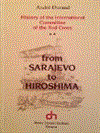

|
|
|
|
|
| Publication |
Geneva, Henry Dunant Institute, 1984.
|
| Description |
675p.Pbk
|
| Standard Number |
2880440092
|
|
|
|
|
|
|
|
|
|
|
|
Copies: C:1/I:0,R:0,Q:0
Circulation
| Accession# | Call# | Current Location | Status | Policy | Location |
| 057322 | 361.77/DUR 057322 | Main | On Shelf | General | |
|
|
|
|
| 4 |
ID:
120663
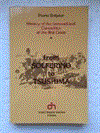

|
|
|
|
|
| Publication |
Geneva, Henry Dunant Institute, 1985.
|
| Description |
391p.Pbk
|
| Standard Number |
2880440122
|
|
|
|
|
|
|
|
|
|
|
|
Copies: C:1/I:0,R:0,Q:0
Circulation
| Accession# | Call# | Current Location | Status | Policy | Location |
| 057323 | 361.77/BOI 057323 | Main | On Shelf | General | |
|
|
|
|
| 5 |
ID:
120632
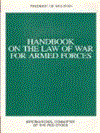

|
|
|
|
|
| Publication |
Geneva, International Committee Of the Red Cross, 1987.
|
| Description |
xxiv; 232p.,1-17p.,1-3p.Pbk
|
| Standard Number |
2881450091
|
|
|
|
|
|
|
|
|
|
|
|
Copies: C:1/I:0,R:0,Q:0
Circulation
| Accession# | Call# | Current Location | Status | Policy | Location |
| 057320 | 341.6/MUL 057320 | Main | On Shelf | General | |
|
|
|
|
| 6 |
ID:
117872
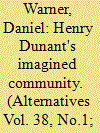

|
|
|
|
|
| Publication |
2013.
|
| Summary/Abstract |
Humanitarian intervention and the responsibility to protect are two examples often used of the separation between humanitarian action and the political. To say that humanitarianism is separate from the political comes from a very particular theological reading. To understand this reading, the article provides a detailed analysis of the life of Henry Dunant, the founder of the ICRC, to show his religious and historical environment in Calvinist Geneva.
|
|
|
|
|
|
|
|
|
|
|
|
|
|
|
|
| 7 |
ID:
120599
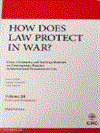

|
|
|
|
|
| Publication |
Geneva, International Committee Of the Red Cross, 2011.
|
| Description |
3vol.set; 508p.Hbk
|
| Contents |
Vol.1: Part I-Outline of International Humanitarian Law
|
| Standard Number |
9782940396122
|
|
|
|
|
|
|
|
|
|
|
|
Copies: C:1/I:0,R:1,Q:0
Circulation
| Accession# | Call# | Current Location | Status | Policy | Location |
| 057313 | 341.6/SAS 057313 | Main | On Shelf | Reference books | |
|
|
|
|
| 8 |
ID:
120600
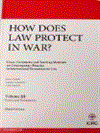

|
|
|
|
|
| Publication |
Geneva, International Committee Of the Red Cross, 2011.
|
| Description |
3vol.set; 511p.-1623p.Hbk
|
| Contents |
Vol 2: PartII-Cases and Documents
|
| Standard Number |
9782940396122
|
|
|
|
|
|
|
|
|
|
|
|
Copies: C:1/I:0,R:1,Q:0
Circulation
| Accession# | Call# | Current Location | Status | Policy | Location |
| 057314 | 341.6/SAS 057314 | Main | On Shelf | Reference books | |
|
|
|
|
| 9 |
ID:
120613
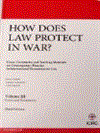

|
|
|
|
|
| Publication |
Geneva, International Committee Of the Red Cross, 2011.
|
| Description |
3 vol.set; 1627p.-2580p.Hbk
|
| Contents |
Vol 3: Part II- Cases and Documents
|
| Standard Number |
9782940396122
|
|
|
|
|
|
|
|
|
|
|
|
Copies: C:1/I:0,R:1,Q:0
Circulation
| Accession# | Call# | Current Location | Status | Policy | Location |
| 057315 | 341.6/SAS 057315 | Main | On Shelf | Reference books | |
|
|
|
|
| 10 |
ID:
138337
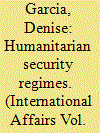

|
|
|
|
|
| Summary/Abstract |
This article introduces a novel concept, humanitarian security regimes, and enquires under what conditions they arise and what is distinctive about them. Humanitarian security regimes are driven by altruistic imperatives aiming to prohibit and restrict behaviour, impede lethal technology or ban categories of weapons through disarmament treaties; they embrace humanitarian perspectives that seek to prevent civilian casualties, precluding harmful behavior, protecting and ensuring the rights of victims and survivors of armed violence. The article explores how these regimes appear in the security area, usually in opposition to the aspirations of the most powerful states. The existing regimes literature has mostly taken a functional approach to analyzing cooperation, lacks a humanitarian hypothesis and does not explore the emergence of new regimes in the core area of security. The author argues that in the processes of humanitarian security regime-making, it is the national interest that is restructured to incorporate new normative understandings that then become part of the new national security aspirations. This article intends to fill this gap and its importance rests on three reasons. First, security areas that were previously considered to be the exclusive domain of states have now been the focus of change by actors beyond the state. Second, states have embraced changes to domains close to their national security (e.g. arms) mostly cognizant of humanitarian concerns. Third, states are compelled to re-evaluate their national interests motivated by a clear humanitarian impetus. Three conditions for the emergence of humanitarian security regimes are explained: marginalization and delegitimization; multilevel agency, and reputational concerns.
|
|
|
|
|
|
|
|
|
|
|
|
|
|
|
|
| 11 |
ID:
098319
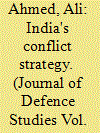

|
|
|
|
|
| Publication |
2010.
|
| Summary/Abstract |
Continued engagement with LOAC and IHL is ongoing with the Judge Advocates
General Department taking the primary role. Its training institution in Kamptee
is at the forefront. There has been increased interaction with the ICRC since
India opened up to the ICRC in the mid nineties, after initially being defensive
with respect to Kashmir. Not only has IHL been introduced into officer and
subordinate ranks courses, but guest lectures are also organised. Increased
scope of the engagement is possible, particularly if it finds mention in the next
edition of the Army doctrine. Increasing the scope of adherence to IHL, such as
by acceding to AP I and the ICC, can be debated. Even if India remains outside,
it can be expected that it would follow the tenets as a responsible power.
|
|
|
|
|
|
|
|
|
|
|
|
|
|
|
|
| 12 |
ID:
120661
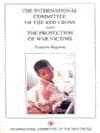

|
|
|
|
|
| Publication |
Geneva, International Committee Of the Red Cross, 2003.
|
| Description |
ixviii, 1161p.Pbk
|
| Standard Number |
0333747712
|
|
|
|
|
|
|
|
|
|
|
|
Copies: C:1/I:0,R:0,Q:0
Circulation
| Accession# | Call# | Current Location | Status | Policy | Location |
| 057312 | 362.87577/BUG 057312 | Main | On Shelf | General | |
|
|
|
|
| 13 |
ID:
102113
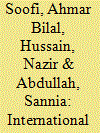

|
|
|
| 14 |
ID:
126253
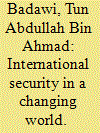

|
|
|
| 15 |
ID:
113271
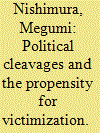

|
|
|
|
|
| Publication |
2012.
|
| Summary/Abstract |
Do victims have particular demographic characteristics that differentiate them from non-victimized persons? Does ethnicity delineate between the victims and the non-victims of violence during armed conflicts, as the media often claims? Have the political cleavages dividing the communities increased the severity of violence? This study addresses these issues by analyzing data from "the People on War project" (the PoW project) through latent class analysis (LCA). Data were collected by the International Committee of the Red Cross (the ICRC) at the 50th anniversary of the signature of the Geneva Conventions in 1999 throughout twelve armed conflict zones in the world.
[Supplemental materials are available for this article. Go to the publisher's online edition of Terrorism and Political Violence for the following free supplemetal resources: Table 2: Exposed Risk of Violence During Armed Conflict and Demographic Factors (With Regional Values), and Table 3: Risk of Violence During Armed Conflict and Demographic Factors (% Having Taken Sides)].
|
|
|
|
|
|
|
|
|
|
|
|
|
|
|
|
| 16 |
ID:
120640
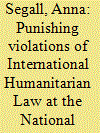

|
|
|
|
|
| Publication |
Geneva, International Committee Of the Red Cross, 2001.
|
| Description |
199p.Pbk
|
| Standard Number |
2881451179
|
|
|
|
|
|
|
|
|
|
|
|
Copies: C:1/I:0,R:0,Q:0
Circulation
| Accession# | Call# | Current Location | Status | Policy | Location |
| 057321 | 341.77/SEG 057321 | Main | On Shelf | General | |
|
|
|
|
| 17 |
ID:
120660
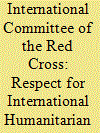

|
|
|
|
|
| Publication |
Geneva, ICRC and Inter-Parliamentary Union, 1993.
|
| Description |
104p.Pbk
|
|
|
|
|
|
|
|
|
|
|
|
Copies: C:1/I:0,R:0,Q:0
Circulation
| Accession# | Call# | Current Location | Status | Policy | Location |
| 057317 | 341.67/INT 057317 | Main | On Shelf | General | |
|
|
|
|
| 18 |
ID:
161075
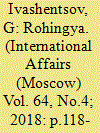

|
|
|
|
|
| Summary/Abstract |
INTERETHNIC CLASHES are not a rarity for many Asian and African countries, and foreign media outlets do not sensationalize them. However, what has happened around the Rohingya community in Myanmar in recent months has largely broken with this pattern. TV screens and newspaper pages have been filled with reports of the purported genocide of the Rohingya perpetrated by the Myanmar authorities: thousands of dead Rohingya, hundreds of burned villages, and thousands of refugees fleeing to Bangladesh. Tough statements were made by leaders, public and religious figures in a number of Muslim states, and the issue was raised at the UN. On certain days, the Rohingya issue in the media was so off the scale that it almost completely eclipsed the situation around Korea, fraught with nuclear conflict.
|
|
|
|
|
|
|
|
|
|
|
|
|
|
|
|
| 19 |
ID:
120676
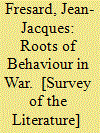

|
|
|
|
|
| Publication |
Geneva, International Committee Of the Red Cross, 2004.
|
| Description |
120p.Pbk
|
|
|
|
|
|
|
|
|
|
|
|
Copies: C:1/I:0,R:0,Q:0
Circulation
| Accession# | Call# | Current Location | Status | Policy | Location |
| 057318 | 355.02/FRE 057318 | Main | On Shelf | General | |
|
|
|
|
| 20 |
ID:
120674
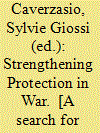

|
|
|
|
|
| Publication |
Geneva, International Committee Of the Red Cross, 2001.
|
| Description |
127p.Pbk
|
| Contents |
Workshops at the ICRC, 1996-2000
|
|
|
|
|
|
|
|
|
|
|
|
Copies: C:1/I:0,R:0,Q:0
Circulation
| Accession# | Call# | Current Location | Status | Policy | Location |
| 057319 | 355.02/CAV 057319 | Main | On Shelf | General | |
|
|
|
|
|
|
|
|
|